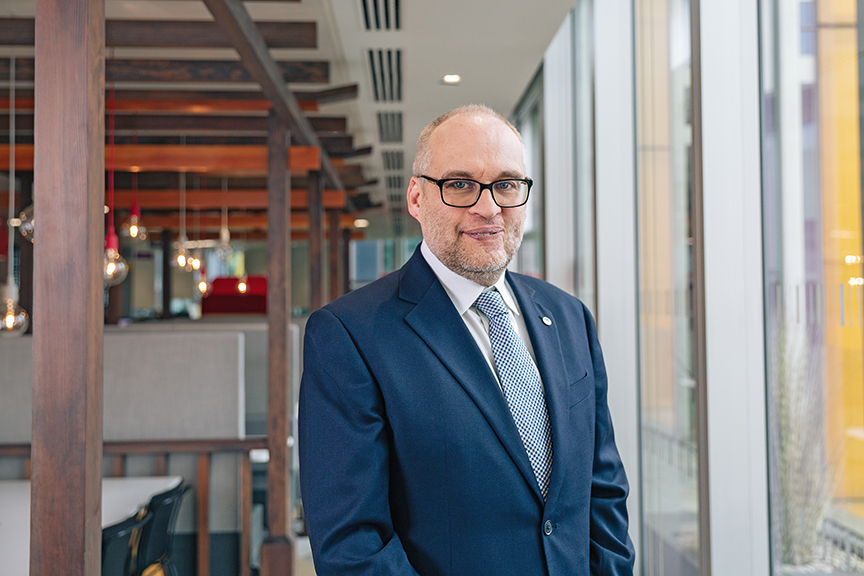Global railway provider Hitachi Rail sees decarbonisation and digitisation as the major drivers of change in the international transport industry.

“Trains relying on alternative power sources – like batteries – and the increasing use of digital technology on the railway will change and improve the way people travel across the world. Hitachi’s innovative technologies put it at the forefront of this transformation,” says Hitachi Rail Group CEO Andrew Barr.
“It’s very exciting.” When Hitachi completed the acquisition of 100% of the Italian-based global transportation company Ansaldo STS in March 2019, Andrew’s first mission as Group CEO was a smooth integration into the group’s existing rail business – famous for its Shinkansen bullet trains in Japan and reliable new commuter trains in the UK.
“Bringing Ansaldo STS into the Hitachi family in January last year allowed us to focus on becoming a full-service provider for railways,” he says. Then COVID-19 came along and everything changed seemingly overnight.
“We got the team together just in time. While we’ve had to help many of our functional teams to work remotely, I’m very grateful to our operations and industrial teams, who have continued to support our customers throughout the pandemic.”
The restructure, with its emphasis on social distancing, allowed the company to continue to honour its maintenance contracts. “Our factories in Japan, France, Italy, the UK and the US have all continued throughout the pandemic, as have our global maintenance teams,” Andrew reveals.
“Focusing on keeping our people safe while maintaining delivery schedules has been a challenge, but I’m proud of the work the team are doing for our customers.” Andrew’s growth plan for Hitachi Rail is to make it a one-stop shop for transport projects.
“Despite COVID-19, our offering as a full-service provider is more important than ever,” he says. “In essence, customers now come to us for trains, to build the new railway itself and then to operate it on their behalf,” he shares.
“All of those skills exist within our portfolio and we’ve got examples of projects around the world where we do those things already – from Copenhagen to Riyadh. We can also support financing and co-innovation partnerships, such as autonomous trains and transforming railways to control trains through the cloud, rather than through extensive and expensive physical infrastructure. We think that a complete offer is something customers will be increasingly interested in as they look to address multiple environmental, economic and social priorities in their countries and cities.”
Meanwhile, the company is looking ahead to address the specific needs of a post-pandemic world. “Reducing contact during rail journeys is going to be very important,” Andrew says. “Whether that’s touching the door button or buying a ticket, people want to make sure they feel safe. The layout of new trains is going to be much more spacious with much more attention paid to air circulation and cleanliness.”
Through the Ansaldo acquisition, Hitachi Rail has added a broad international experience in signalling and turnkey projects in the Americas, EMEA and APAC, as well as an established global supply chain.
“It’s a completely different business that is largely reliant on suppliers from all over the world,” Andrew says. “It’s crucial to have partners who understand where we are heading so they can meet the needs of our changing – and quite dynamic – business.”
To nurture these relationships, the company holds supplier days where new and existing suppliers are invited to meet the team and talk about the business or suggest improvements. “It’s a two-way thing,” Andrew says.
“It’s really helpful to get their feedback on what it takes to have a good relationship. I think the key thing is working out how we can learn from our shared experiences and keep the relationships strong.”
Hitachi Rail’s ultimate vision of lower-emission electric railways isn’t a distant plan either; ingenious groundwork is already being laid. To subvert the expense of electrified infrastructure, the company can retrofit its trains with electric batteries – replacing the diesel engines supplied by MTU, a part of Rolls-Royce – to create hybrid trains.
“That way, people get the benefit of electric trains earlier while you make a business case for a full-blown infrastructure overhaul,” Andrew explains. In north-east England, Hitachi Rail has partnered with Hyperdrive to develop batteries that can provide enough power to run trains on batteries alone, a shift that would decarbonise and improve passengers’ journeys.
“On battery, you can actually run a train from a city hub all the way along the branch line for a more seamless journey,” Andrew says. The batteries can then be charged when the train is stopped at a station.
“Tackling climate change by decarbonising transport will be a major driver for our business in the next 20–30 years, so this is an important step for our business and our offer to customers.”


